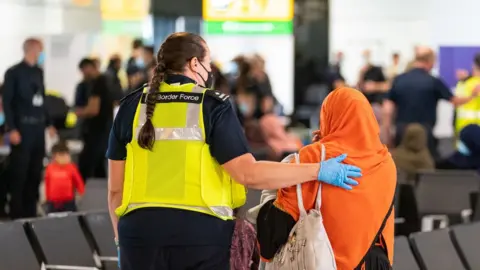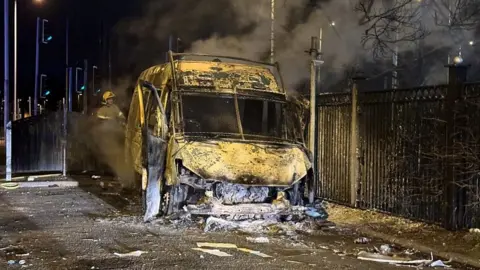Migrant hotel costs rise to £8m a day, Home Office figures show
 PA Media
PA MediaThe cost of housing migrants in hotels has risen to £8m a day, according to new figures from the Home Office.
The use of hotels has increased over the last few years as the number of people entering the UK illegally or claiming asylum has hit record levels.
The government has promised to "reduce" the use of hotels to house migrants while their claims are processed.
In March the BBC learned around 400 hotels were being used, costing nearly £7m a day.
The Home Office's Annual Accounts, published on Tuesday, promised to "take action to address the unacceptable costs of housing migrants in hotels which is costing the taxpayer around £8m a day".
A government source said the new figures showed "why we've got to get migrants out of hotels and stop the boats".
Yvette Cooper, Labour's shadow home secretary, accused the Conservatives of "busting the Home Office budget, breaking the asylum system, and the British people are paying the price".
"Shockingly, the cost of hotel accommodation has gone up by a third since Rishi Sunak promised to end hotel use," she added.
The government has a legal obligation to provide asylum seekers - who are not allowed to work while their claim is being processed - with a basic level of accommodation.
Asylum seekers would typically only be housed in hotels or hostels for a few weeks, before being moved to long-term self-catered homes.
However the increase in people claiming asylum -and the backlog of unprocessed claims - has led to a growth in the use of hotels to provide temporary accommodation.
A government source said: "We're confident our Rwanda scheme, which is awaiting a judgment from the Supreme Court, will break the people smugglers' business model.
"All Labour would do is add to the problem by welcoming our fair share of the million asylum seekers in the European Union every year and make illegal migration legal."
Sir Keir Starmer suggested a Labour government may be willing to accept migrants in the UK in exchange for a returns deal - as part of a plan to crack down on international people smuggling gangs. But Labour have denied they would formally join the EU quota scheme.
Afghan refugees
The government announced on Tuesday it had ended the use of hotel accommodation to house thousands of Afghan families given refuge in the UK.
The families had come to the UK under the Afghan Citizens' Resettlement Scheme - set up in the wake of the Taliban's takeover of Afghanistan in 2021.
Cabinet Office minister Johnny Mercer confirmed the government had met its deadline to end the use of these bridging hotels for Afghan refugees by the end of August.
He told the Commons more than 85% of the 8,000 Afghans who were living in hotels at the end of March had now been moved into homes or pre-matched into settled accommodation.
He added that fewer than 5% of the 24,600 people relocated from Afghanistan were now in temporary accommodation provided by their local council, with some "regrettably" turning down suitable offers of housing.
The Local Government Association previously said one-in-five Afghans leaving hotels were presenting to councils as homeless.
Mr Mercer said no Afghans had slept rough throughout the process.
However, Labour shadow minister Luke Pollard said the treatment of Afghans, many of whom worked with the British government, was "shameful".
He added that an estimated 1,000 Afghans accessing homelessness support "is nothing to smile about".

In recent months, hotels housing asylum seekers have been targeted by demonstrations which have sometimes turned violent.
Under the government's Rwanda plan, announced in April 2022, some asylum seekers would be sent to Rwanda, to claim asylum there.
The legality of the scheme is currently being considered by the Supreme Court, after an earlier ruling by the High Court that the Rwanda plan was lawful.
Prime Minister Rishi Sunak has made reducing the numbers coming to the UK illegally one of his key priorities.
The Illegal Migration Act, which was passed this year, gives ministers new powers to remove anyone arriving in the UK illegally.
But it has attracted fierce criticism including from the Archbishop of Canterbury, who said it risked "great damage" to the UK's reputation.
Last year the number of people arriving in the UK in small boats via the English Channel hit over 45,000 - the highest number since figures were first collected in 2018. The total number of people to have landed on UK shores in 2023 now stands at about 21,000.
The number of people claiming asylum has also risen to a 20-year high. In the 12-months to June 2023, 97,390 people applied for asylum.
